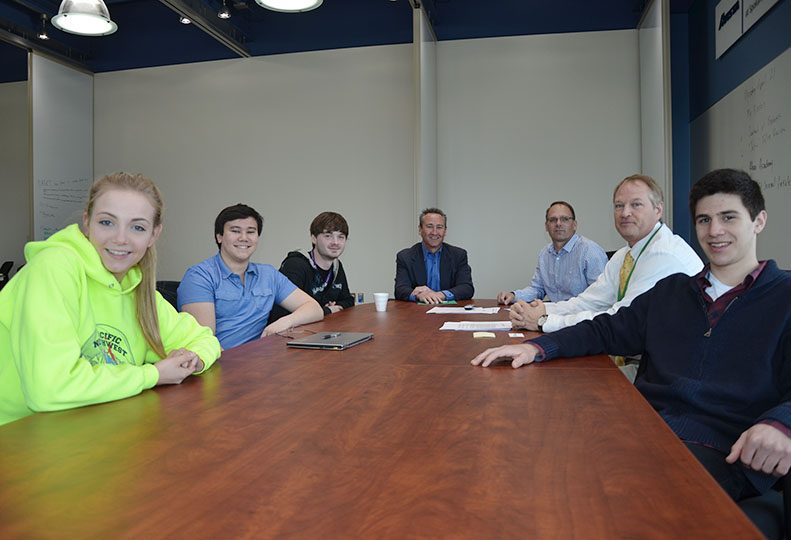
Home » Avista makes investment in educating prospective entrepreneurs
Avista makes investment in educating prospective entrepreneurs
Students exposed to business practices, real experience

May 8, 2014
Steven Walton, a Dishman Hills High School senior in Spokane Valley, wants to build a business to provide fresh, home-cooked, healthy meals delivered right to your door.
Seiji Furukawa, a sophomore at Spokane Valley Tech, dreams of creating a center where entrepreneurs can go to access any and all resources they may need to start a business.
Tori Keizer, a senior at Freeman High School, envisions a business providing all things wedding related, and Jonathan Tomlinson, a senior at University High School, hopes to launch his own clothing line someday.
All four student entrepreneurs may have an edge in making their business dreams come true given that they are all enrolled in Spokane Valley Tech’s Entrepreneurship Program, sponsored by Avista Corp., of Spokane.
SVT, located at the southeast corner of Sprague Avenue and University Road, is a collaboration with Central Valley, East Valley, Freeman, and West Valley school districts that offers students technical skills and experience in growing industries, with a focus on career and college readiness.
The entrepreneurship center’s classrooms, with technology capabilities and movable walls, occupy about 1,400 square feet in the building at 115 S. University. The building was retrofitted in early 2013 after the Washington state Legislature allocated $1.5 million in capital funds for the second of three phases to complete SVT.
The Entrepreneurship Program at SVT was implemented during the 2013-2014 school year.
Avista started the Centers For Entrepreneurship Network in 2007 with $100,000 in seed money to help Spokane Community College develop a program to help students prepare for and launch a business upon completion of the program. The program was so successful, says Steve Trabun, Avista regional business manager, the curriculum was licensed and Avista has expanded by starting centers in three other colleges in its three-state service area, as well as the SVT program.
“We now have centers in North Idaho College in Coeur d’Alene, Rogue Community College in Medford, Ore., and at the Walla Walla Community College in Clarkston,” Trabun says. Each of the participating colleges received $100,000 from Avista, he says, to get their programs up and running.
Scott Oakshott, SVT director says, SVT received a $25,000 contribution from Avista that is being used primarily to promote the program in the Spokane area.
SVT entrepreneurship students attend morning classes from 8 to 10:30 a.m., five days a week, totaling 454 hours of instruction during the school year, in accounting, marketing, investing, taxes, writing a business plan, and technology, among other areas. There are currently only four students in the program, but there is space for 18 in each class. Students can also receive college credit for some of the coursework, Oakshott says.
Additionally, two students each year will be eligible for a microloan of up to $15,000 from Avista to start a new business.
“We may have two students apply for the loan at the end of this school year,” he says.
Oakshott says he is impressed with the four students who are currently in the entrepreneurship program and expects the program to grow steadily.
Furukawa is enrolled full time at SVT in advanced engineering as well as the entrepreneurship program. Last November, he participated in Startup Weekend Spokane, a 54-hour, three-day event sponsored by Avista. The event provides a high-energy atmosphere in which entrepreneurs can pitch their business ideas, and teams form around ideas to develop them into viable business ventures. Furukawa was a member of the first-place finalist group, Team Sili.
Furukawa’s team worked on an attachment for earbuds that fit better than traditional earbuds and block ambient noise. After the team designed the product, it used a 3-D printer at SVT to make a prototype.
“That’s part of what started a fire under me to start a business,” Furukawa says. “It was such a high-energy and positive atmosphere and there was so much camaraderie between teams. It was starting something that you could actually see happening … you could see the reality of the business.”
Patrick Bisson, SVT instructor for the entrepreneurship program, says SVT’s entrepreneurs also are working on a coffee cart project, “not only to provide more coffee to students and faculty, but so students can experience the reality of actually running a business,” Bisson says
“Students have been building the coffee cart in their manufacturing class, and they will run it as a real business doing market research, ordering the products, making the coffee, and everything that goes with a typical business,” he says.
This school year SVT has expanded to include not only the entrepreneurship program but also coursework in aerospace and advanced manufacturing, fire science, sports medicine, cosmetology, and advanced biomedical applications.
Avista’s Steve Trabun says the company is dedicated to the business entrepreneurship programs because small business is the catalyst of economic development in most communities, and when small businesses are doing well, the community is growing and thriving.
“These programs make for good community stewardship, it’s good for economic development, and the programs create jobs, and job development. It’s not just good for the teens and individuals,” Trabun says. “It’s good for the whole community.”
Latest News Education & Talent
Related Articles
Related Products



![Brad head shot[1] web](https://www.spokanejournal.com/ext/resources/2025/03/10/thumb/Brad-Head-Shot[1]_web.jpg?1741642753)
